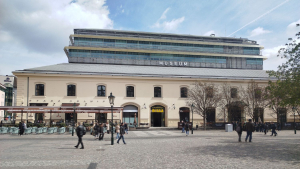
The property markets of individual countries are affected by a number of external factors, so it is not evident that they are doing equally well in a small region like CEE. What are the strong and weak points of Hungary's property market compared to other countries in the region? How successfully has it weathered the COVID crisis? What will be the best development and investment opportunities in the coming period? These were the questions discussed by the international investors’ panel at the 2021 edition of Property Investment Forum in Budapest.
Aurelia Luca, EVP Operations Hungary and Romania at Skanska Commercial Development Europe said that the Hungarian market has reacted well to the COVID crisis and growth is ahead for both the Hungarian and Romanian markets. In order to build up the private rented sector (PRS) in the Hungarian market, a balance must be found among regulations, owners and tenants. Investors will only enter the market if rental contracts provide financial safety for them, while tenants are looking for a place that will not evict them after six months. In the office market, flexibility is the keyword, not just in contracts but also in rented space and environment. The ratio of spaces supporting joint work clearly has a bigger emphasis now as employees choose WFH when working on individual projects. The retail component is also increasingly important when renting offices.
Rudolf Riedl MRICS, Managing Director of SÜBA Hungary said regarding the rental property sector that Hungary is characterised by a high ratio of property ownership due to historical reasons. Furthermore, the fact that current laws protect tenants does not attract investors as there is no guarantee that tenants can be evicted if they do not pay the rent. Buying residential property is a good investment for many, but it should be recognised that renting allows much more flexibility in certain stages of life than owning an apartment. Riedl believes in the continued stability of the office market.
Huw Roberts, CEO of Graphisoft stressed that digitalisation offers the biggest benefits to property owners and managers with regard to design, construction and management. This is true for the entire global market, but the CEE region now has an opportunity to make an even bigger jump. As for the office market, conditions have clearly changed and so has the method of working, meaning not just WFH but also how the office has become the venue for joint work. Regarding sustainability, it is an important issue on both the design and management side of buildings, as the materials used for construction and the distance these have to be transported are critical in this regard. In closing, Roberts called attention to the importance of sharing know-how and experiences among various fields as information flow is indispensable for development.
Robert Snow, Chairman of GTC Hungary said it remains unclear how the office market will change in the next 2 or 3 years but it is clear that "tenant-friendly" strategies are called for. It is important for office building owners to listen to customers and make sure tenants feel good. Vacancies have increased but the office market will be all right in the future, he said. Regarding green bond issues, Snow said these represent an excellent opportunity that GTC has made use of repeatedly. The assets of the future will be environmentally friendly properties, he concluded.
Pascal Steens, General Manager at Nhood Hungary said there are fundamental differences between the Hungarian market and other countries, and pointed out that the extra costs arising from swiftly increasing construction material prices represent a challenge for ongoing projects. Regarding the rental property market, the availability of substitute products is an important question. Families are currently able to take out cheap loans from banks, which again points towards a higher ownership ratio. As for the future, Steens believes in multifunctional spaces instead of stand-alone retail units. The 15-minute city concept could be the future, where all important services can be reached in 15 minutes or less.
Hannes Wimmer, Executive Director, Loan Syndication at Erste Group Bank AG said an important question for the future of the office market is how often employees will have to be present in the office and how they plan to meet co-workers in the future. As for ESG criteria, these began with regulations introduced for banks this year but are already important for tenants, banks and investors alike. This trend will eventually reach all industries, Wimmer said. He expects strong growth in the logistics property market, but the office and retail segments will also have a future in his opinion.



